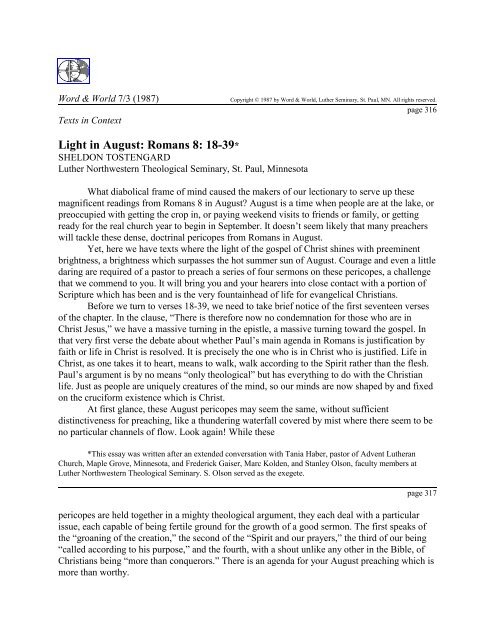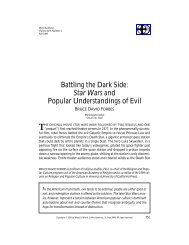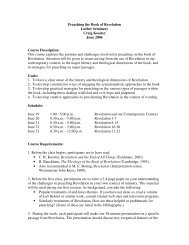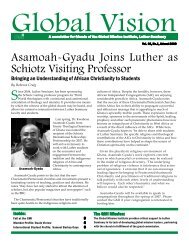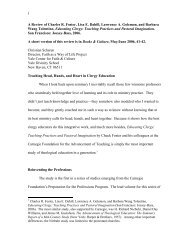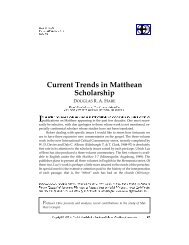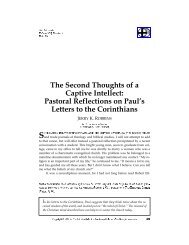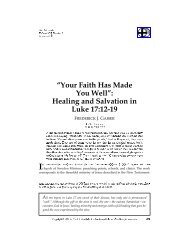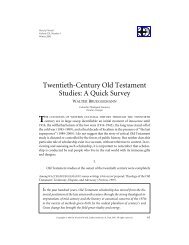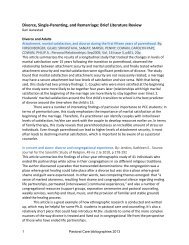Light in August: Romans 8: 18-39* - Word & World - Luther Seminary
Light in August: Romans 8: 18-39* - Word & World - Luther Seminary
Light in August: Romans 8: 18-39* - Word & World - Luther Seminary
You also want an ePaper? Increase the reach of your titles
YUMPU automatically turns print PDFs into web optimized ePapers that Google loves.
<strong>Word</strong> & <strong>World</strong> 7/3 (1987)Texts <strong>in</strong> ContextCopyright © 1987 by <strong>Word</strong> & <strong>World</strong>, <strong>Luther</strong> Sem<strong>in</strong>ary, St. Paul, MN. All rights reserved.page 316<strong>Light</strong> <strong>in</strong> <strong>August</strong>: <strong>Romans</strong> 8: <strong>18</strong>-<strong>39*</strong>SHELDON TOSTENGARD<strong>Luther</strong> Northwestern Theological Sem<strong>in</strong>ary, St. Paul, M<strong>in</strong>nesotaWhat diabolical frame of m<strong>in</strong>d caused the makers of our lectionary to serve up thesemagnificent read<strong>in</strong>gs from <strong>Romans</strong> 8 <strong>in</strong> <strong>August</strong>? <strong>August</strong> is a time when people are at the lake, orpreoccupied with gett<strong>in</strong>g the crop <strong>in</strong>, or pay<strong>in</strong>g weekend visits to friends or family, or gett<strong>in</strong>gready for the real church year to beg<strong>in</strong> <strong>in</strong> September. It doesn’t seem likely that many preacherswill tackle these dense, doctr<strong>in</strong>al pericopes from <strong>Romans</strong> <strong>in</strong> <strong>August</strong>.Yet, here we have texts where the light of the gospel of Christ sh<strong>in</strong>es with preem<strong>in</strong>entbrightness, a brightness which surpasses the hot summer sun of <strong>August</strong>. Courage and even a littledar<strong>in</strong>g are required of a pastor to preach a series of four sermons on these pericopes, a challengethat we commend to you. It will br<strong>in</strong>g you and your hearers <strong>in</strong>to close contact with a portion ofScripture which has been and is the very founta<strong>in</strong>head of life for evangelical Christians.Before we turn to verses <strong>18</strong>-39, we need to take brief notice of the first seventeen versesof the chapter. In the clause, “There is therefore now no condemnation for those who are <strong>in</strong>Christ Jesus,” we have a massive turn<strong>in</strong>g <strong>in</strong> the epistle, a massive turn<strong>in</strong>g toward the gospel. Inthat very first verse the debate about whether Paul’s ma<strong>in</strong> agenda <strong>in</strong> <strong>Romans</strong> is justification byfaith or life <strong>in</strong> Christ is resolved. It is precisely the one who is <strong>in</strong> Christ who is justified. Life <strong>in</strong>Christ, as one takes it to heart, means to walk, walk accord<strong>in</strong>g to the Spirit rather than the flesh.Paul’s argument is by no means “only theological” but has everyth<strong>in</strong>g to do with the Christianlife. Just as people are uniquely creatures of the m<strong>in</strong>d, so our m<strong>in</strong>ds are now shaped by and fixedon the cruciform existence which is Christ.At first glance, these <strong>August</strong> pericopes may seem the same, without sufficientdist<strong>in</strong>ctiveness for preach<strong>in</strong>g, like a thunder<strong>in</strong>g waterfall covered by mist where there seem to beno particular channels of flow. Look aga<strong>in</strong>! While these*This essay was written after an extended conversation with Tania Haber, pastor of Advent <strong>Luther</strong>anChurch, Maple Grove, M<strong>in</strong>nesota, and Frederick Gaiser, Marc Kolden, and Stanley Olson, faculty members at<strong>Luther</strong> Northwestern Theological Sem<strong>in</strong>ary. S. Olson served as the exegete.page 317pericopes are held together <strong>in</strong> a mighty theological argument, they each deal with a particularissue, each capable of be<strong>in</strong>g fertile ground for the growth of a good sermon. The first speaks ofthe “groan<strong>in</strong>g of the creation,” the second of the “Spirit and our prayers,” the third of our be<strong>in</strong>g“called accord<strong>in</strong>g to his purpose,” and the fourth, with a shout unlike any other <strong>in</strong> the Bible, ofChristians be<strong>in</strong>g “more than conquerors.” There is an agenda for your <strong>August</strong> preach<strong>in</strong>g which ismore than worthy.
Pentecost 8: The Groan<strong>in</strong>g of the Creation, <strong>Romans</strong> 8: <strong>18</strong>-25.The use of contrast for emphasis is an old scheme and Paul makes bold use of contrast <strong>in</strong>8:<strong>18</strong>. Just as he knew that his readers were be<strong>in</strong>g put upon for the sake of their faith, and just ashe chose to take their suffer<strong>in</strong>g with absolute seriousness, so also Paul contended that theirpresent difficulty only made a darkness aga<strong>in</strong>st which the brightness of their future glory wouldsh<strong>in</strong>e like the sun. And do not suppose that the glory which Paul promised was ephemeral andidealized when compared with the particular suffer<strong>in</strong>g at hand. By no means, for the glory tocome is a glory revealed, a glory given, a glory shaped and def<strong>in</strong>ed by the death and resurrectionof Jesus.Can the preacher make a simple, hermeneutical identification here, one of those simpleidentifications which sometimes works but more often does not? Certa<strong>in</strong>ly it does not r<strong>in</strong>g true tobeg<strong>in</strong> by say<strong>in</strong>g that just as the Roman Christians suffered, so also we suffer. We know thatth<strong>in</strong>gs are not at all the same these days. Ease and a bland acceptability very well typify ourchurchly experience. Yet, who would deny that there is plenty of suffer<strong>in</strong>g <strong>in</strong> this “present time”?Suffer<strong>in</strong>g has no bless<strong>in</strong>g with<strong>in</strong> itself, and the Christian is never exempt from responsibility toand for it. Nevertheless, for Paul, the arena of the world’s suffer<strong>in</strong>g was both a sign of the glorythat will be ours and the very arena where our Lord is work<strong>in</strong>g out that glory.When Paul moves his already bold argument from verse <strong>18</strong> to verse 19, he becomesaudacious <strong>in</strong> the extreme. On the one hand, any naive sentimentalism we might have about theworld is undone. Whatever is meant by the suffer<strong>in</strong>g of the creation, whether it is simply lifeunfulfilled or life rag<strong>in</strong>g red <strong>in</strong> tooth and claw, the creation clearly provides no sure home orclear sign of hope for the s<strong>in</strong>ner. On the other hand, the futility of the entire creation, togetherwith the particular suffer<strong>in</strong>g of the Roman Christians, is now made a negative sign of God’sglory which is to be revealed. The whole sad, slump<strong>in</strong>g creation is, for the apostle, noth<strong>in</strong>g but asign of the glory to come.That “the whole creation has been groan<strong>in</strong>g <strong>in</strong> travail until now” (8:22) is, of course,knowledge which is available to all persons. Whether it is the thorns and thistle among the stalksof good gra<strong>in</strong> or the ecological wounds more recently gouged upon the body of the earth, all thisgroan<strong>in</strong>g can be heard by anyone. But what is not known abroad is that the whole creation,however <strong>in</strong>nocent, was subjected to futility for our sakes, <strong>in</strong> order that its groan<strong>in</strong>g might be asign of the glory to be revealed and so that we might have hope for the redemption of the wholecreation.Just as the groan<strong>in</strong>g of the whole creation is a sign of the glory to be, so also our groan<strong>in</strong>gis like that of a woman labor<strong>in</strong>g to br<strong>in</strong>g forth a child. Herpage 3<strong>18</strong>groan<strong>in</strong>g is altogether genu<strong>in</strong>e, even frighten<strong>in</strong>g to those who hear. Yet, for her, it is a groan<strong>in</strong>gencouraged by hope for the child that is already com<strong>in</strong>g <strong>in</strong>to the world. And soon, when the childis fully born, the suffer<strong>in</strong>g of the mother will be completely taken up <strong>in</strong>to joy.In his panegyric on hope <strong>in</strong> 8:24-25, Paul comes close to equat<strong>in</strong>g hope with faith, anatural equation <strong>in</strong> that hope is faith’ s disposition toward the future. Society’s hope for thefuture is by no means guaranteed these days. If the time of my own youth was called an age ofanxiety, this age can truly be called an age of hopelessness. One sees it especially <strong>in</strong> the strugglesof the young. As creatures of our age, we go by what we see and the prognosis for the future on
the basis of what we see is not good. Thanks be to God that our hope need not rest on what wesee but rather on the action of our savior, which action is made sure and steadfast <strong>in</strong> our hear<strong>in</strong>g.While our hope is patient, as patient as that of the seafarer who knows that <strong>in</strong> the morn<strong>in</strong>gthe lights of home will appear on the horizon, our hope is by no means resigned. Hope is<strong>in</strong>fectious, a strange and deep optimism which takes all groan<strong>in</strong>g and travail absolutely seriously,and yet rejoices. Let it be said of us Christians <strong>in</strong> these times that we are known by our hope.Pentecost 9: The Spirit and Our Prayers, <strong>Romans</strong> 8:26-27.In these verses the apostle speaks aga<strong>in</strong> of weakness and the spirit but this time with<strong>in</strong> anew frame of reference, that of prayer.Certa<strong>in</strong>ly the subject of weakness is never so sore for preachers as when the matter ofprayer comes up. To make the subject of prayer the agenda of a pastor’s conference is to ensure alot of uncomfortable twist<strong>in</strong>g and turn<strong>in</strong>g <strong>in</strong> the seats. Is there sufficient discipl<strong>in</strong>e <strong>in</strong> my prayerlife? Do I pray enough for others or mostly for myself? Is there a good measure of praise andthanksgiv<strong>in</strong>g <strong>in</strong> my pray<strong>in</strong>g, or am I always ask<strong>in</strong>g, ask<strong>in</strong>g, ask<strong>in</strong>g? We know well enough thatprayer is turned <strong>in</strong> upon ourselves, marked and faulted by weakness and s<strong>in</strong>.If Paul knows the dilemma of our pray<strong>in</strong>g, he also takes away a hoped-for solution. Ourhope may be that once we have reached a certa<strong>in</strong> level of Christian sophistication, a certa<strong>in</strong>facility <strong>in</strong> our faith, prayer will issue from our lips with purity and ease. We imag<strong>in</strong>e that it mightbe as facile as a conversation between good friends. But no, says Paul, for the very weakness towhich he refers <strong>in</strong> these verses is the weakness of the cruciform character of the Christian life.Even as we are be<strong>in</strong>g “conformed” to the image of the crucified Christ, we will not “know howto pray as we ought” (8:26).In what way “ do we not know how to pray as we ought?” What is the precise nature ofthis particular problem of prayer? As Roy Harrisville has rightly po<strong>in</strong>ted out, 1 it has to do withthe conjunction between prayer and the hope which is described <strong>in</strong> 8:24-25. How shall we prayfor those manifestations of our hope which we have not seen? How shall we give patientarticulation to our dim, and often perverse sense of what it might be like to be an adopted child of1Roy A. Harrisville, <strong>Romans</strong> (Augsburg Commentary on the New Testament; M<strong>in</strong>neapolis: Augsburg,1980) 133.page 319the Almighty? How shall we be able to capture with our bodily, lip-shaped words what it will befor our bodies to be redeemed? In these matters, even <strong>in</strong> faith, we are hopelessly out of our depth,and it is only the Spirit’s own help that gives shape to our hope. How can we pray for that whichwe have not seen and thus be patient <strong>in</strong> our hope? Alas, we cannot! But there is one who helps us<strong>in</strong> our weakness, one who teaches us to pray as we ought, one who “<strong>in</strong>tercedes for us with sighstoo deep for words” (8:26).What can we say about the “sighs” of the Spirit that are “too deep for words”? Are theremysteries here far beyond our know<strong>in</strong>g and our preach<strong>in</strong>g? Perhaps so, but at least some th<strong>in</strong>gscan be said. Certa<strong>in</strong>ly the <strong>in</strong>tercession of the Spirit is at the deepest personal level, truly a matterof the heart. It is an <strong>in</strong>tercession even beyond our reasonable selves and the reasonable words bywhich our prayer must f<strong>in</strong>ally be made, an <strong>in</strong>tercession beyond our emotional selves by whichour words are shaped and colored. In other words, it is beyond the reason which we cannot often
trust and which cannot comprehend our hope, and it is beyond our feel<strong>in</strong>gs which often lie to usand which turn Christian hope <strong>in</strong> upon the self. There, <strong>in</strong> the deepest self which is perhaps movedonly by a sigh, the Holy Spirit of Christ is sigh<strong>in</strong>g to and for us, speak<strong>in</strong>g to God on our behalf.We may be assured that the Spirit’s speak<strong>in</strong>g <strong>in</strong> and for us will grasp our hope and be “accord<strong>in</strong>gto the will of God” (8:27).page 320Pentecost 10: Those Called Accord<strong>in</strong>g to His Purpose, <strong>Romans</strong> 8:28-30.Roy Harrisville calls this little pericope “the h<strong>in</strong>ge of the epistle,” 2 a h<strong>in</strong>ge which<strong>in</strong>troduces a new element and culm<strong>in</strong>ates the argument, but by no means a h<strong>in</strong>ge which suddenlymakes everyth<strong>in</strong>g clear. Quite the contrary, for here, just at the h<strong>in</strong>ge, the fulcrum, the argumentof the apostle becomes terribly dense. It is as though Paul peers <strong>in</strong>to the sav<strong>in</strong>g m<strong>in</strong>d and heart ofGod and sees there a certa<strong>in</strong> foreknowledge, a certa<strong>in</strong> predest<strong>in</strong>ation, a certa<strong>in</strong> work<strong>in</strong>g out ofGod’s purpose no matter what. Then, because he has had this look <strong>in</strong>to the heart of God <strong>in</strong>Christ, Paul pla<strong>in</strong>ly asserts that “<strong>in</strong> everyth<strong>in</strong>g God works for good with those who love him”(8:28).Certa<strong>in</strong>ly the struggl<strong>in</strong>g Christians at Rome wondered whether God was absent fromthem <strong>in</strong> direct relationship to the depth, the darkness of their struggle. Does not every Christiansometimes wonder that same th<strong>in</strong>g? Yet, <strong>in</strong> spite of translation problems, 8:28 is clear, “<strong>in</strong>everyth<strong>in</strong>g God works for good” and <strong>in</strong> the soar<strong>in</strong>g close to this chapter, we will f<strong>in</strong>d that Paul’s“everyth<strong>in</strong>g” covers just that—from the airy height where the angels s<strong>in</strong>g to the deepest depthwhich is death.This little pericope is the supreme challenge for a preacher and should you choose toaccept it, you would do well to start with 8:29. Whoever starts with 8:28 runs the risk of turn<strong>in</strong>git <strong>in</strong>to conventional wisdom, a capsule encouragement for life, a theological version of theproverbial say<strong>in</strong>g that “<strong>in</strong> every cloud there’s a silver l<strong>in</strong><strong>in</strong>g.” To reduce 8:28 to conventionalwisdom would be to do a terrible <strong>in</strong>justice to Paul’s magnificent argument and to rob his goodword of its true goodness.“For those whom he foreknew he also predest<strong>in</strong>ed to be conformed to the image of hisSon (8:29).” The God who is at work among us is a God who is <strong>in</strong> control and who will surelybr<strong>in</strong>g about his <strong>in</strong>tended purpose. And make no mistake; while we ought not use the language ofcausality here, as though God is toppl<strong>in</strong>g us like so many dom<strong>in</strong>oes for his own amusement,neither shall we say that God is “lett<strong>in</strong>g be what will be.” God is known to be active andaggressive <strong>in</strong> br<strong>in</strong>g<strong>in</strong>g about his sav<strong>in</strong>g purpose.The purpose which God is steadfastly br<strong>in</strong>g<strong>in</strong>g about is conform<strong>in</strong>g us to the “image ofhis Son,” that very son who went down to death between two thieves for our sakes. That is thejourney on which the sovereign God is tak<strong>in</strong>g us, a cruciform journey for Christ’s sake and <strong>in</strong>Christ’s image, where the it<strong>in</strong>erary is by no means only on the heights but rather <strong>in</strong> the everydaydepths near which we always f<strong>in</strong>d ourselves.Here there is no note of evolutionary optimism, as though some <strong>in</strong>crement of good isalways be<strong>in</strong>g worked out <strong>in</strong> spite of appearances. Here there is no shallow comfort that falsehopes and dreams, once dashed on the relentless wheel, can yet be appreciated as hav<strong>in</strong>g hadsome value and made some contribution. Here there is a sense of civilization’s value andnecessity, but a clear warn<strong>in</strong>g that we must not expect too much of any of society’s structures.
Start<strong>in</strong>g with 8:29 and know<strong>in</strong>g that it is the image of Christ to which we are be<strong>in</strong>gconformed also keeps us from reduc<strong>in</strong>g 8:28 to the idea that there is a hidden good <strong>in</strong> all evil,that “every cloud has a silver l<strong>in</strong><strong>in</strong>g.” Thank God that2R. Harrisville, <strong>Romans</strong>, 133.page 321Paul does not make Christ’s gospel cont<strong>in</strong>gent on refus<strong>in</strong>g to take life absolutely seriously.Thank God that this gospel is <strong>in</strong>f<strong>in</strong>itely wider and deeper than the platitud<strong>in</strong>ous “everyth<strong>in</strong>g willbe all right.” Thank God that Christ’s gospel is not apart from but encompass<strong>in</strong>g of our bitternessand desolation as we stand by the grave of our very dearest. Thank God that Christ is us<strong>in</strong>g eventhe worst that s<strong>in</strong>, death, and the devil have to give us <strong>in</strong> order to br<strong>in</strong>g about his steadfast sav<strong>in</strong>gpurpose.“And those whom he predest<strong>in</strong>ed he also called” (8:30). The work of the sovereign God<strong>in</strong> Christ is our call, news of what God has set out to accomplish for us. Thus, the news ofpredest<strong>in</strong>ation is precisely the most precious, sav<strong>in</strong>g word that <strong>in</strong> “everyth<strong>in</strong>g God works forgood to those who love him.” That is the description of God’s foreknowledge, the bluepr<strong>in</strong>t forChrist’s predest<strong>in</strong>ation, the most blessed news for the repentant heart. What you now experience,be it height or depth, will not annul what God <strong>in</strong>tends.F<strong>in</strong>ally, does this mean that our own actions are of no consequence? On the one hand, itis true that what we do is of no consequence at all, none whatever alongside God’s grand scheme.On the other hand, our actions are of every consequence for we are be<strong>in</strong>g “conformed to theimage of his Son,” to the image of the Jesus of the cross, and there, whether <strong>in</strong> the depths or onthe heights, our hope will sh<strong>in</strong>e like a beacon.Pentecost 11: More Than Conquerors, <strong>Romans</strong> 8:35-39.With these verses we have the lyric culm<strong>in</strong>ation of Paul’s argument for faith. Thepericope, as it is here marked out, beg<strong>in</strong>s and ends with the idea of separation, the idea that noone or anyth<strong>in</strong>g will be able to separate the believer from the love of God <strong>in</strong> Christ. Faithfulpraise becomes doxology as Paul’s believ<strong>in</strong>g confidence is juxtaposed with his tak<strong>in</strong>g absolutelyseriously all the potential separation that occurs <strong>in</strong> life, even the frighten<strong>in</strong>g division of death.It is a shame that verses 31-34 have been left out of the pericope. Mark<strong>in</strong>g pericopes outis never easy, at best the result of necessity, but this omission seems particularly unfortunate. Thetheological rationale for the whole section is established <strong>in</strong> these verses. God, who “did not sparehis own Son” (8:32) is for us. Therefore, “who shall br<strong>in</strong>g any charge aga<strong>in</strong>st God’s elect?”(8:33). Clearly the victory offered to faith is not a charade, not “religious” or “spirituall” not anescape, but a sure and certa<strong>in</strong> hope <strong>in</strong> Christ <strong>in</strong> the face of both f<strong>in</strong>itude and death.In 8:35 we see that it is the love of Christ that is to be tested, tested by all those realities<strong>in</strong> life that threaten to separate the believer from it. Paul’s first deadly list of separat<strong>in</strong>g calamitiesis taken right from a Roman Christian’s worry list: “Tribulation, or distress, or persecution, orfam<strong>in</strong>e, or nakedness, or peril, or sword.” Paul is test<strong>in</strong>g the love of God for us far beyond theconventional annoyances of bourgeois existence, far beyond everyday frustrations or some lackof personal fulfillment. “The wolf may be at the door,” your vocational hopes may be shatteredby a crisp note, or a beloved child may lie feverish <strong>in</strong> an antiseptic room; let come what may,says the great apostle, for noth<strong>in</strong>g of a tragic nature can separate you from the love of Christ.
page 322Why would one even read these texts and listen so closely to them if one were not alreadyconv<strong>in</strong>ced that these great separat<strong>in</strong>g forces will, by and by, come also to us. Paul rem<strong>in</strong>ds usaga<strong>in</strong> of a curious, wonderful, and at the same time frighten<strong>in</strong>g Christian freedom, namely, thatwe don’t have to go around f<strong>in</strong>d<strong>in</strong>g crosses. They will come along of their own accord, andplenty soon enough.Paul heightens the tension beyond what may seem to be theologically bearable by quot<strong>in</strong>gfrom Psalm 44: “For thy sake we are be<strong>in</strong>g killed all the day long.” The very forces of life whichthreaten to separate us from God are <strong>in</strong> God’s hands, a part of God’s sav<strong>in</strong>g purpose. This versedemands our utmost theological attention. The language is not causal, as we often th<strong>in</strong>k it to be,nor does it simply refer to the po<strong>in</strong>t of view of the believer, as though everyth<strong>in</strong>g depended onour see<strong>in</strong>g some “hidden bless<strong>in</strong>g” <strong>in</strong> our suffer<strong>in</strong>g. Even <strong>in</strong> tribulation, especially <strong>in</strong> fam<strong>in</strong>e,particularly when a child lies feverish <strong>in</strong> an antiseptic room, we are be<strong>in</strong>g molded <strong>in</strong>to thecruciform existence of Christ and are closer to him than ever. Just when the separat<strong>in</strong>g forces aregreatest is our bond with the savior deepest.Verse 37: Only now, when Paul has listed all the great tragedies of tearful existence, noneof which can separate us from God’s love, does he speak of our be<strong>in</strong>g conquerors. Only now canwe let that victorious word roll over our believ<strong>in</strong>g lips, know<strong>in</strong>g that all the earthly conquestswhich threaten to separate us from Christ are taken down <strong>in</strong>to the cross and resurrection andthere transformed. We are conquerors, make no mistake, but only because our champion hasbound us to himself and now bears us along on a triumphant, f<strong>in</strong>al journey.So let us rejoice <strong>in</strong> our hope, dear Christian friends, let us rejoice with abandon, for justas the depth of death cannot separate us from Christ, neither can the lively, angelic height of ourjoy.


